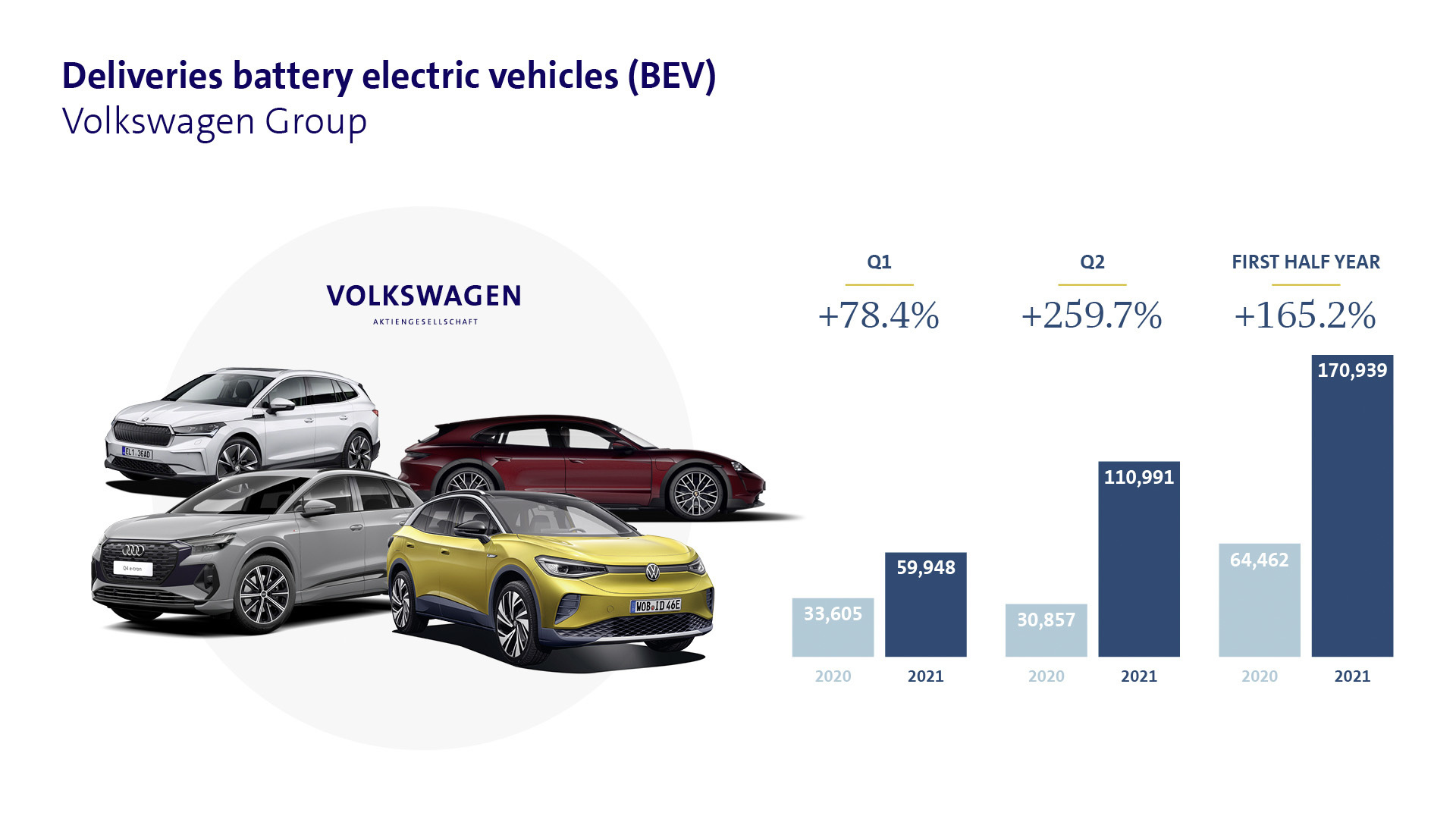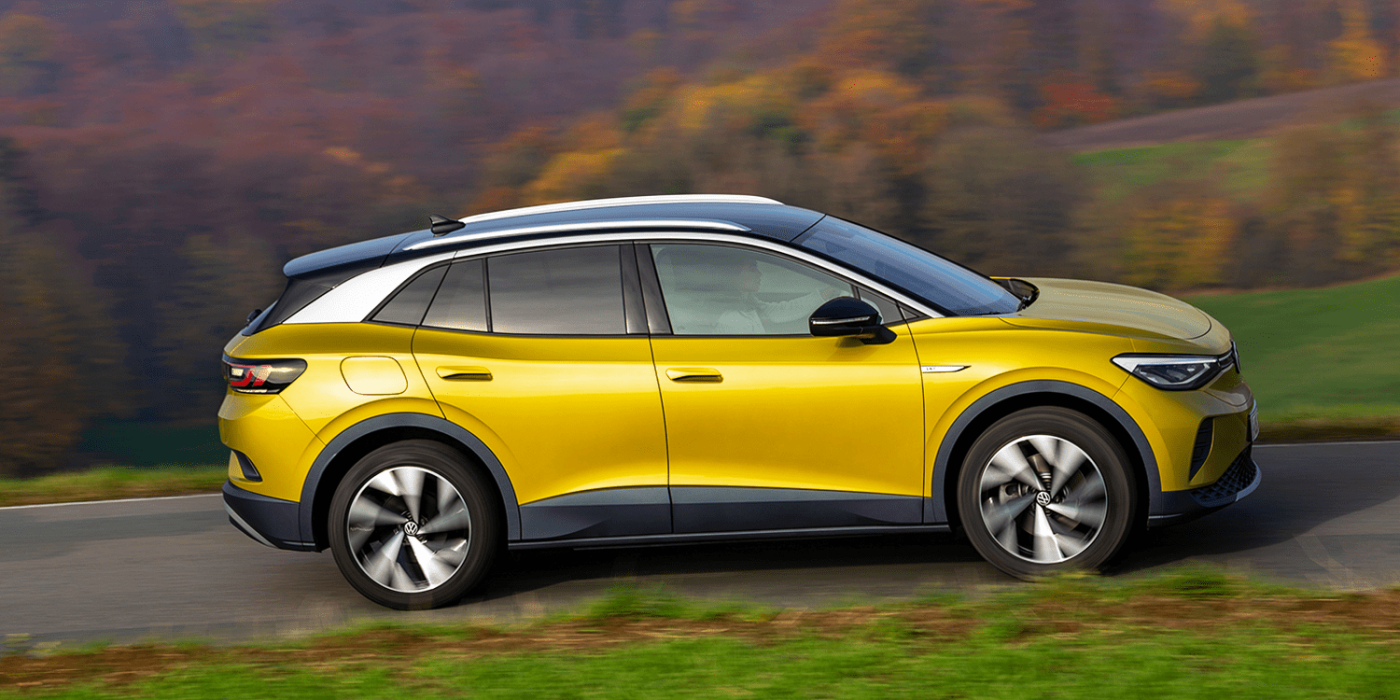Volkswagen sells over 170,000 EVs in first half of 2021
Volkswagen AG delivered more than twice as many electric cars in the first half of 2021 as in the same period last year (+165.2%). The Group had sold 170,939 battery-electric cars worldwide by the end of June, 110,991 of them in Q2 of this year alone.
In addition, the Group delivered a total of 171,300 plug-in hybrids in the first half of the year, more than three times as many as in the same period last year (+204.2 per cent). In the case of PHEVs, there were 56,303 units in H1 2020 and 67,462 vehicles in the case of BEVs.
Volkswagen said it expects the BEV ramp-up to accelerate further over the course of the year due to the expanded model range. “Our global electric offensive continues to make good progress, and customer demand is high,” said Christian Dahlheim, head of sales at the group level. “This year, we plan to deliver around one million electrified vehicles for the first time and are confident that we will meet the fleet targets for CO2 emissions in Europe.”
Europe also saw the vast majority of the group’s electric car registrations. Specifically, there were 128,078 vehicles, or 74.9 per cent of all Group BEVs. 26 per cent of all battery-electric cars registered in Europe thus came from the VW Group.

In the USA, the Group’s brands delivered 18,514 battery-electric cars and achieved a market share of nine per cent in BEVs – more than in the overall market with combustion models added.
In China, 18,285 BEVs were delivered in the first half of the year, representing 10.7 per cent of the group’s global BEV deliveries. The Group justifies these figures with the order of market launches: The ID.3, as a purely European model, made the start, and the ID.4 was also initially delivered primarily in Europe. The ID.4 has only been available in the USA and China since March.
While VW has maintained its market share in China with internal combustion vehicles, the electrification offensive is progressing more slowly than planned. In June, just 2,900 ID.4s were sold in China, in addition to 500 units of the ID.6 electric SUV developed especially for China. In May, ID.4 sales were also disappointing with 1,213 units. According to a report in the Handelsblatt, VW China boss Stephan Wöllenstein indicated that the chip shortage had hit the group hard in China, especially in the second quarter. “Often you win with a platform strategy, but in times of a global chip shortage, it has hurt us a bit,” Wöllenstein said, according to the report. Reuters sees the situation more hopefully and quotes Wöllenstein saying: “We hope the chip supply crisis will bottom out this summer and expect to see an improvement in this situation within the second half of the year.”
In the release on half-year sales, Dahlheim expressed optimism – partly because of ID.6 shipments, which only started in June. “In the third quarter, we expect a significant boost to BEV deliveries in China thanks to the expanded Volkswagen ID. model range,” says the sales manager.
A quick look at the brands and models: Of the 170,939 BEVs delivered across the Group, 54.3 per cent or 92,859 units came from the core Volkswagen brand. Audi and Porsche accounted for 32,775 vehicles (share: 19.2 per cent) and 19,822 vehicles (share: 11.6 per cent) respectively. Skoda follows close behind with 17,697 battery-electric cars (i.e. the Citigo iV and the Enyaq); the Czech company accounted for 10.4 per cent of the Group’s BEVs. Seat came to 6,172 units or 3.6 per cent, but only with the Mii electric – the MEB-powered Cupra Leon has not yet been delivered.
In terms of vehicles, the ID.4 went straight to the top, even though it has only been delivered since the end of March. The MEB SUV came to 37,292 new registrations but is also delivered in the USA and China, as mentioned. The 31,177 units of the ID.3, on the other hand, are all on the road in Europe. In third place with worldwide deliveries comes the Audi e-tron quattro (including Sportback) with 25,794 vehicles) ahead of the Porsche Taycan (including Cross Turismo) with 19,822 vehicles. The e-Up closes the top 5 at the group level with 17,890 vehicles.
With reporting by Sebastian Schaal, Germany.
reuters.com, volkswagen-newsroom.com, handelsblatt.com (in German)





0 Comments